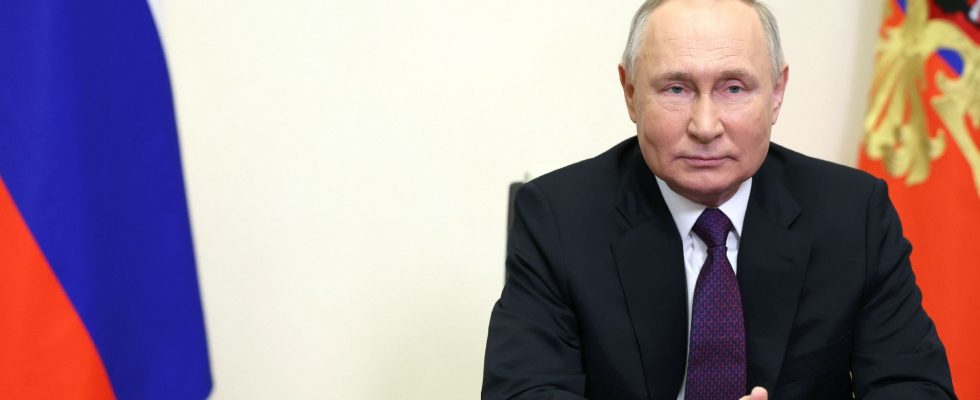Serving Vladimir Putin, the Russian presidential administration’s mission is to ensure that nothing will hinder the coronation of the “tsar” during the presidential election on March 15. These all-powerful technocrats, led by former Prime Minister Sergei Kirienko, usually operate in complete secrecy. But there was a leak. Estonian media Delfi has in fact disclosed a series of Excel files, meeting minutes and reports which shed harsh light on the dark designs of Putin’s henchmen. Edifying, these secret documents, analyzed and cross-checked with public sources, reveal the extent of the presidential administration’s budget devoted to ideological and informational control over the Russian population and the annexed territories.
In total, 1.1 billion euros were allocated for the presidential election, the Kremlin’s informational and ideological war, mass surveillance and the “integration” of Russian “new regions” – the Ukrainian territories occupied Donetsk, Luhansk, Kherson and Zaporizhia. “These documents confirm exactly how [le Kremlin tente] to reshape the entire ideology of the Russian state, believes Russia specialist Mark Galeotti, interviewed by Delfi. They also show how this is implemented [dans le détail]. It’s apparently a regime that considers itself in great difficulty.”
Propaganda and patriotic films
The “Kremlin Leaks” tell us that the most famous Kremlin propagandist, Vladimir Solovyov, received 1.5 billion rubles from the Russian state budget in 2023, or around 15 million euros. An astronomical salary, which will be doubled in 2024.
But using this type of media personality is clearly not enough to flood the population with war propaganda, tinged with the “traditional values” dear to Vladimir Putin. The presidential administration therefore created a network of around fifteen NGOs, whose activities are controlled and financed by the Kremlin. Among them, the Internet Development Institute, chaired by Alexei Goreslavsky, benefits from the largest budget. Goreslavsky’s mission is to “strengthen civic identity and spiritual and moral values” and “support and disseminate government content” through the production of films and series reflecting the Kremlin’s ideology. He received nearly 220 million euros last year and is due to receive 180 million this year.
Since last October, the production of films expressing patriotic values has been running at full speed. At least two new films are released every month: their unsubtle storylines celebrate traditional values or heroes of Russian history, like the film “Code: Passenger”. Scheduled in theaters next March, it features a young Russian writer who “leaves his peaceful life behind and volunteers for the war in Donbass”… Another patriotic creation, the 12-episode series GDR (German Democratic Republic) is broadcast from this February on the Russian streaming site Wink. We follow the story of a Soviet spy who finds himself at the center of intrigues involving the world’s main intelligence services. Presumably inspired by Vladimir Putin’s career as a spy, this character holds the destiny of East Germany in his hands in the series.
The promotion of these “works” is ensured by state media and opinion leaders, responsible for spreading the content on social networks and throughout Russia.
Secret polls
In addition to the major events organized by the presidential administration to highlight Vladimir Putin’s candidacy for re-election on March 15, such as the “World Youth Festival” (16.7 million euros) or “The International Exhibition of Russia” (47 million euros), the Kremlin also allocates a large budget to privately survey the opinions of its fellow citizens. The presidential administration thus spent 3.6 million euros on “secret polls” concerning the presidential election, and 5.8 million euros on polls in occupied Ukraine.
According to Delfi, these surveys are carried out to test the “temperature” of society in order to be able to react adequately. In other words, plan for the falsification and manipulation of votes that will be necessary on election day.
Censorship in the occupied territories
A considerable effort appears to be being made to isolate the Ukrainian population in the occupied territories from the rest of Ukraine and the world. An Internet blocking system would have received 10 million euros last year in order to “resist the dissemination of “prohibited” information, to block “prohibited” content, to ensure the functioning of the Internet Russian and to resist external threats and attacks.” That’s a total budget of 89.6 million euros.
Other so-called NGOs also reportedly received funding to monitor young Ukrainians from the occupied territories on social media. An organization would thus control more than 52 million profiles on the Internet, more than a million of which would be listed as “dangerous” by the authorities. The documents consulted by Delfi also indicate the establishment of a system to automatically detect the distribution of “prohibited content” using artificial intelligence. Finally, certain documents detail a project to allocate 13 million euros over the next three years to Readovkaa Russian news agency that plans to launch a new media network in the occupied Ukrainian territories.
Since last year, the authorities have also organized “cultural and educational events” in these “new territories”, particularly on “patriotic” days, such as February 23 (Defender of the Fatherland Day) or November 4 (unity national). “On those days, huge Russian and Soviet flags fly, schoolchildren sing patriotic songs, soldiers distribute flowers to women and grandmothers make them pancakes in return,” writes Delfi, for whom this obsession with total control of the population reflects the wavering legitimacy of Russian power.
.
